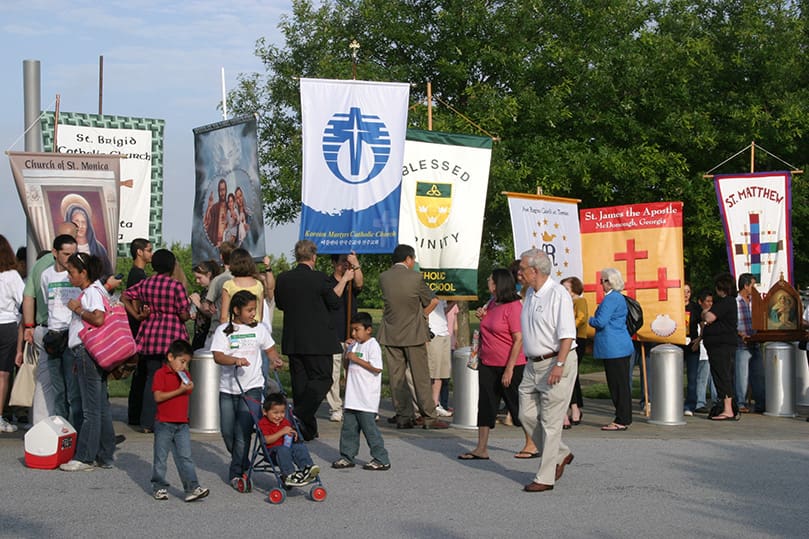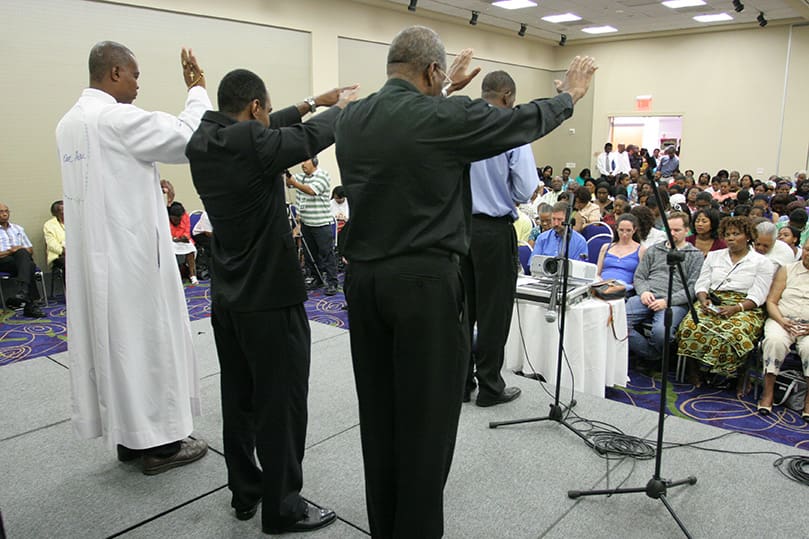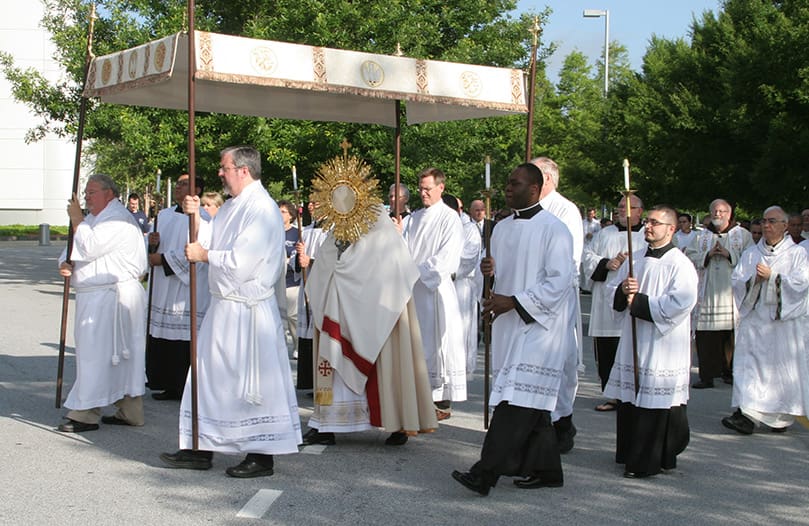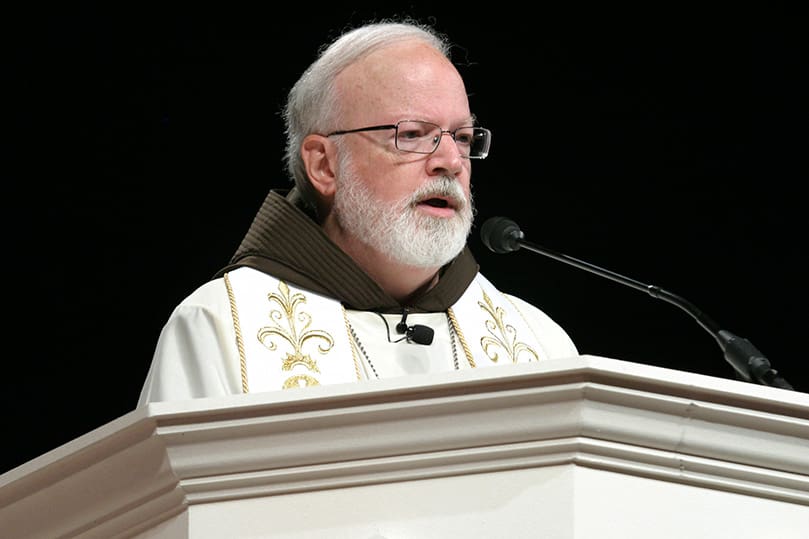People representing a variety of Catholic Church affiliations gather in preparation for the morning procession. Photo By Michael Alexander
College Park
Many Voices Echo Common Devotion To Eucharist
By GRETCHEN KEISER, Staff Writer | Published June 10, 2010
With the boom of a Vietnamese drum and gong, thousands of people from many cultures in the Archdiocese of Atlanta came to attention June 5, showing again that they share a reverent belief in God’s presence in the Eucharist and a joyous desire to celebrate his love and nearness.
For the 15th year, the two-day Eucharistic Congress of the archdiocese was an exuberant, colorful, huge gathering of Catholics, who came to listen to speakers, pray in silence before the Blessed Sacrament, go to confession, and enjoy a public celebration of their faith on the feast of Corpus Christi.
The theme—“To Sanctify the Christian People”—was chosen by Archbishop Wilton D. Gregory from the prayer of priestly ordination in honor of the Year for Priests declared by Pope Benedict XVI. The event began June 4 with an evening Mass celebrated by Auxiliary Bishop Luis R. Zarama, a healing service, new tracks in Portuguese and French, and a late night session for young adults.
Early on the following morning of June 5, Vietnamese elders dressed in royal blue traditional “aó dai” prepared to call the throngs in the Eucharistic procession to attention with their large drum and gong, known as the chieng.
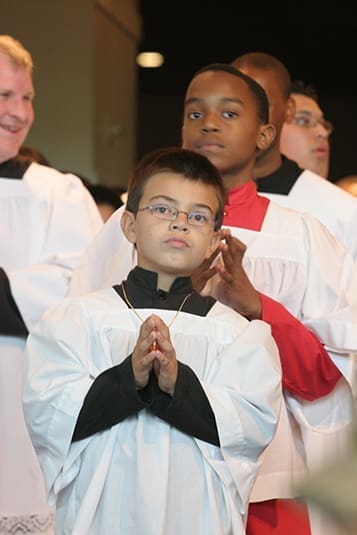
(Front to back) Ten-year-old Joshua Gilbertson of St. Monica Church, Duluth, and 13-year-old Daniel Omuto of Saint Marguerite D’Youville Church, Lawrenceville, join the procession of altar servers for the closing Mass. Photo By Michael Alexander
“I come every year. I love it,” said Hung Nguyen, a computer programmer. “I don’t look at how big or how successful it is. I look for the touch of God in people’s hearts.”
The Eucharistic Congress is needed “to revive the hearts of every people,” said Nguyen, president of the parish council at Our Lady of Vietnam Church in Riverdale.
“We come to worship him and adore him. … We can see a big picture of God’s people. An event like this strengthens our faith, no doubt about it,” he said, as the 8:30 a.m. procession began, with the cadence set by the drummers.
About 100 banners followed, carried by people from parishes in every part of North Georgia, from Catholic schools and lay groups, including Spanish Cursillo, nocturnal adoration societies, Knights of Columbus councils, Legion of Mary, lay associates of the Monastery of the Holy Spirit, Marriage Encounter, the Catholic charismatic renewal and Vietnamese, Korean, Hispanic, Filipino, Nigerian and Haitian Catholics.
As the procession moved inside the Georgia International Convention Center, the sound of the shofar echoed, and walking between rows of Knights of Peter Claver and Knights of Columbus, Archbishop Gregory held the monstrance, ascending the carpeted steps and placing it on the altar. Ministerio de Alabanza Emmanuel and St. Ann’s music group led Spanish, Latin and English hymns.
Rediscovering Awe
After adoration and Scripture readings, Cardinal Seán O’Malley of Boston, the homilist, spoke, saying that at the Last Supper Jesus gave a new commandment, “love one another as I have loved you,” and a new gift, the sacrament of the Eucharist.
“He loves us first. He loves us to the end. He loves us to the point of laying down his life for us. He loves us while we are still in sin,” Cardinal O’Malley said.
While this command to love is daunting, “he gives us the sacrament so we can live this life of love. … It strengthens us. It challenges us.”
The Eucharist comes to God’s people through the priesthood, the cardinal added. “This wonderful gift (the priesthood) makes the Eucharist available everywhere for all times.”
Speaking with a deep, resonant voice, the white-bearded cardinal said, “Many today find the teaching too hard to believe and simply stop coming.”
However, “Jesus’ words and actions assure us he has left us a miracle of love in the Eucharist,” he said. “Our God loves us and the Eucharist is a celebration of that saving love.”
At the same time, the Mass “reminds us of our need for repentance and conversion.”
He told of a missionary to the Masai people in Africa. When the priest reached a Masai village, dancing and prayers would precede the celebration of the Eucharist, and could go on for a day. The tribal leaders would decide if the community was ready to come to the Eucharist. It was not always celebrated if the leaders decided there was sin in the community, he said.
The cardinal, a member of the Capuchin Franciscan order, said the American cultural environment is one of “entertainment and entitlement.”
Contrast that with Moses taking off his shoes in the presence of the burning bush or Peter falling down before Jesus after the miraculous catch of fish and saying, “Depart from me, Lord, for I am a sinful man.”
“The Eucharist is a greater miracle than the miraculous draught of fish,” the cardinal said, a miracle to be approached with awe and humility.
He prayed the Congress would be “an Emmaus experience for all of us.”
After meeting Jesus in the breaking of the bread, the disciples immediately set out to tell others. Like them, the cardinal prayed that participants will experience “Eucharistic amazement” and “when we enter into Communion with Christ, we will sense the duty to be a witness.”
Friendship With God
Archbishop J. Michael Miller of Vancouver, Canada, a speaker in the general track, said that in the Year for Priests, Pope Benedict XVI offered priests and laity an occasion to reinforce awareness and knowledge of “the extraordinary gift of grace an ordained minister represents for the church and the world.”
In recent discourses the pope has spoken of why the priest’s role as sanctifier is so important, he continued.
“Every man and woman is called to holiness. The priest has a role to play as an instrument in fostering that holiness.”
In growing in holiness a person moves out of himself or goes beyond himself, the archbishop said. The transformation of a person’s inner being makes him the property of God. That person is set apart in order to love the world as God does.
“An intimate friendship with God is the foundation of our holiness,” Archbishop Miller said.
“It is Christ himself who draws us into God’s sphere … but he shares that mission of being a mediator with priests. He does that by the sacrament of Holy Orders.”

Father Roger Araujo, parochial vicar for the Brazilian community at Holy Family Church, Marietta, leads the congregation in prayer during the Brazilian Track, June 4. Photo By Michael Alexander
In addition to the priest’s role in fostering friendship with Christ, he is a minister of the proclamation of the Gospel and he gives the Catholic community the sacraments, above all, the sacrament of the Holy Eucharist, Archbishop Miller said.
Proclaiming the Gospel is “a prophetic task of placing us in contact with the One who is the way, the truth and the life.”
A priest is “the voice,” he said, while “Christ is the Word.”
Other general track speakers were Deacon Dennis Dorner, chancellor of the archdiocese, Johnnette Benkovic, Allen Hunt, Father Leo Patalinghug and Jesuit Father Mitch Pacwa. Simultaneous programs for children and teens were held as well as in Vietnamese and Spanish and American Sign Language.
Throughout the Congress, points of view and expressions of faith were as diverse as the people gathered. But the dynamic between members of the clergy and lay people seemed to be authentically sympathetic and supportive.
About 73 priests came over the two days just to hear confessions of some of the estimated 20,000 to 30,000 people there. An adoration chapel where the Blessed Sacrament was placed throughout the day was always filled with 75 to 100 people silently praying.
‘I Am Proud Of My Church’
In the track for French-speakers, which was a new track in 2010, a group of participants wore T-shirts with the image of Our Lady of Perpetual Help on the front and on the back in French or in English, “I am Catholic. I am proud of my church.” People filled the room to capacity, and chairs were set up outside so more could hear the speakers. The whole room was singing and clapping.
“It’s enormous for the French-speaking community and especially the Haitian community to have this track,” said Rose Mary Jean-Louis, a parishioner of Our Lady of Lourdes Church in Atlanta.
While her Haitian mother, standing nearby, prays in Creole, Rose Mary, who was born in Brooklyn, N.Y., is English speaking but understands French and Creole. She said the opportunity to pray and worship in one’s native tongue and in a culturally familiar way is vital.
“It really meant a lot as you can see,” she said, pointing to the overflow crowd and those wrapped around the edges of the room and crowded in the doorways.
“There is a very large Haitian Catholic community here. It hasn’t always been recognized. To be recognized this year, especially with the earthquake in Haiti, really means a lot.”
“It also speaks to the unique worship style of the Haitian community, which is very lively with dance and vocal expression. It means a lot to worship in your own language. There is a special connection with God,” said the young woman, who is a website editor.
Dominique Goda, a native of Haiti who has lived in the United States since 1981, said the speaker, Father Jules Campion, challenged them to remove from their lives anything that is keeping them away from the Eucharist, which is the center of their spirituality.
“To leave adultery, to leave sin in general—envy, jealousy, all those capital sins,” said Goda, a Kroger store manager who lives in Douglasville. “Otherwise we cannot get close to God.”
The priest encouraged them to try to go the sacrament of confession at least once a month.
It was a great help that four Haitian priests were available on June 5 to hear the confessions of those who speak Creole, he said.
“Some of our elders don’t speak a word of English,” he said.
“We are so elated,” he said, as the crowd sang and clapped for joy, attracting people who were just passing by to stop and join them, whether they understood the words or not.
‘They Opened A Door For Us’
Denis d’Almeida of Jonesboro, a native of Togo, said the French-language track was “very positive.”
At his parish, St. Philip Benizi in Jonesboro, they have a mixed group of French speakers from African countries and Haiti. D’Almeida, who teaches French in the DeKalb County school system, came to Georgia in 2002. He has been to the Eucharistic Congress before.
“Each year we have something more to experience. This year, they opened a door for us and we appreciate it very much,” he said. “We can involve more people.”
When people move to metro Atlanta they find a diversity of religions and denominations. Finding Catholics from one’s culture or language in a parish often makes the difference between staying Catholic or leaving the church, he said.
“If you are Catholic and you come here and you have the opportunity to have a parish, it is helpful to keep you Catholic. … If they don’t, we lose them.”
“You have to do it quickly,” he added.
At St. Philip Benizi he was encouraged and helped by a priest there to found a movement to try and assist newly arriving French-speaking immigrants to connect with people at the parish.
The Eucharist “is the center of our religious life, the main thing we need to focus on if we want to increase our faith,” he said.
The Spanish-language track at the Eucharistic Congress was also full to capacity.
Sandra and Refugio Gallegos, members of St. Matthew Church, Winder, came with their daughters, Celeste, 3, and Alexandra, 10 months.
In the Hispanic track, speakers “were talking about being sanctified and bringing Christ into our jobs, our homes,” Sandra Gallegos said.
She appreciates the Congress, which she has come to for six or seven years, because it brings “so many people … together” and because of “the love we have for the Eucharist and the teachings they give.”
Her husband, who works installing granite countertops, agreed that it was not always easy to remain faithful to Christ’s teachings in contemporary society.
“It is a little challenging,” he said.
“Pretty much our whole society draws you away from Christ and what we believe. But if Christ is for you, who can be against you,” he said.
They are active at St. Matthew’s and before they started their own family, they worked with young people at St. Lawrence Church in Lawrenceville.
‘I Am Praying For You, Father’
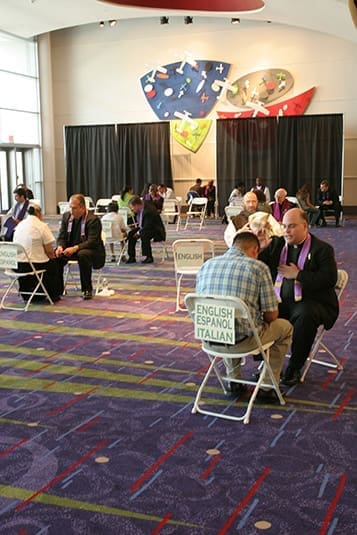
Priests from around the archdiocese hear the confessions of individuals during a four and half hour period. Some 32 priests were available as confessors during the busiest time. Photo By Michael Alexander
A track for Brazilians in Portuguese, also a new track, was well attended.
Rev. Mr. Carlos Vargas, who served with the Portuguese community at St. Jude Church in Atlanta last year, said he loved working among them.
“Their joy and their faith,” he exclaimed, when asked what he meant. “The presence of God with them always was joy.”
A banner in the track proclaimed the “Comunidade Brasileira de Atlanta”; the image of Mary as Our Lady of Aparecida, the patroness of Brazil, stood in the center.
Volunteer Marcos Fernandes said the community first began to come together in 1999 as Father Jack Vessels, a Jesuit priest who spoke Portuguese, began celebrating Mass for them at St. Jude and then Father Pedro Poloche, who spoke Spanish and English, learned Portuguese and began assisting him. Mass was celebrated monthly first and then twice a month. Father Sebastian Andrade, a Brazilian living in Canada, was the next priest to come, and he started celebrating Mass at Holy Family Church in Marietta.
The 1996 Olympic Games drew Brazilians to Georgia, Fernandes said, as people told friends and family that there were opportunities here. The numbers are estimated at 25,000 to 30,000 Brazilians in the state, he said. Brazil has reopened a consulate here as numbers grew.
Father Roger Araujo, who now ministers to the Portuguese-speaking community in the archdiocese, led wholehearted praise of God as the monstrance was carried into the room June 4 and placed on the altar at the front.
Rev. Mr. Vargas said, “I think this is one of the beautiful things in the Catholic Church. We can move from different styles and different ways to pray.”
He has felt very excited about his approaching ordination to the priesthood.
“Especially people in this year, they became more mindful about the importance of the priest,” he said. “I hear people say, I am praying for you, Father. I say, thank you.”
They say it “as if it is their responsibility always to pray for us.”
Father Poloche said that the Brazilian community is growing and members may be drawn away from the Catholic Church if priests do not minister to them.
“Many of the Protestant churches are very welcoming, and I am afraid we are losing many of them,” Father Poloche said. “It was good” to initiate a Brazilian Track at the Congress.
He said the Year for Priests “has been a good year.”
“There are many people who have been very grateful, and they express gratitude to the priests. I always tell my people anything good we do it is because of their prayers and their support. Their prayers mean a lot.”
At the closing Mass of the Eucharistic Congress, where music was led by Dr. Kevin Johnson, the Our Lady of Lourdes Choir and the Katharine Drexel Choir, Archbishop Gregory said that he had researched the history of the archdiocese and that more than 360 men have been listed among the diocesan priests over the years, a number which does not include the many religious order priests who have also served in North Georgia.
“The Eucharist has been made present through their generous ministry and continues to be so today,” the archbishop said.
“Pray for more vocations to the clerical and religious life,” he urged in closing.
He also announced that the theme for the 2011 Eucharistic Congress on June 24-25 will be “The Harvest Is Abundant.”
Deacon Dorner, chairman of the Eucharistic Congress steering committee, said he thought this year’s event was “easily the smoothest we have had” in his five years of involvement.
“Working on the Congress committee is a labor of love,” he said.
“When you think of all that Jesus does for us, how could we not respond with our best efforts in a celebration of his Real Presence in the Eucharist.”
